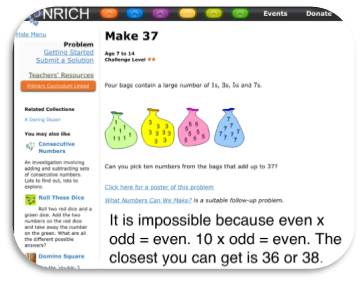Copyright © University of Cambridge. All rights reserved.
'Make 37' printed from https://nrich.maths.org/
Show menu
Well done to everybody who had a go at this task. Lots of children worked out that it was impossible - you can't make 37 with a combination of ten 1s, 3s, 5s and 7s. Some children explained why they thought this was impossible, and we've focused on those solutions here.
Luca from The Village School in the USA said:
You can't get 37 by adding together 10 odd numbers.
Freddie explained why this isn't possible:
I think that it's impossible because you cannot make an odd number with an even number of odd numbers.
Well spotted! I wonder why we can't make an odd number with an even number of odd numbers?
Ethan from Hong Kong International School also explained why this is impossible:
There is no solution to this problem, since there are only odd numbers. And we know that odd + odd is always even. And there are ten numbers which makes it 5 even numbers, and even + even is always even. However, 37 is odd.
Thinking about adding five even numbers instead of ten odd numbers makes it much more obvious that the answer will always be even. Ci Hui Minh Ngoc from Kelvin Grove State College in Brisbane, Australia sent in this picture to represent adding the ten odd numbers together, starting by adding pairs of odd numbers to make even numbers:

Can you see how they've added the numbers at each step of the table?
Maisy and Will from Pencoys Primary in the UK found out that there wasn't a solution by working systematically:
Over a series of lessons, we used trial and error to solve the problem. We were so close and kept either reaching 36 or 38! This made us work systematically and we worked through all of the possibilities there are. Now more determined than ever, a whole lunch time later, we finally found our theory:
When you add odd numbers such as 1s, 3s, 5s and 7s used in ‘Make 37’, if you add them an even amount of times (such as 10) you will always get an even answer e.g. 7+3+1+7+5+1+7+5+1+1=38 which does not work. This proves our theory right as the only options to select were odd numbers. Another example 5+5+5+5+7+3+3+1+1+1=36.
If it were 9 numbers or 11 numbers it would be possible.
It sounds like you worked really hard on this, and then you were able to show that it would never be possible with ten numbers - well done! Ellen from Cheam Common Junior Academy in the UK had a similar idea:
I started off by trying to add ten numbers to make 37. After several tries, I noticed that I could make 36 or 38, but not 37 itself. I noticed that the numbers 1, 3, 5 and 7 are all odd numbers. I experimented with adding groups of odd numbers together and we found out that when adding two odd numbers together, the answer was always even e.g. 7+7=14 (even). When I added three odd numbers together the answers were always odd e.g. 9+9+9=27 (odd) 5+5+5=15 (odd). I noticed that if I added an even number of odd numbers together, then the answer would always be even. So it is impossible to make 37 from ten odd numbers!
Ryan and Zac from Banstead Prep School in England used multiplication instead of addition to show that the problem was impossible:
In our solution to this problem, we started by writing out all of the numbers and gradually crossing them off after every time we used.
The closest that we got was 36 (ten numbers) 38 (ten numbers) and 37 (nine numbers). After a long while we started questioning even and odd multiplication and addition.
Fortunately for us, we remembered that even multiplied by odd = even.
As soon as we had remembered that we found out that it was impossible to get 37 because 10 x odd = even.

Well remembered! I wonder how you could prove that an even number multiplied by an odd number will always be an even number?
We were also sent in similar solutions by: Om from St Leonards Exeter; Hwan from Hong Kong International School; Drayvian and Avi from Banstead Prep School in England; Jade and Aala from North London Collegiate Junior School in the UK; Sophie from Glenfall in the UK; Elliott from Richmond Methodist Primary School in the UK; and Matthew from Devonshire House in England. Thank you all for sending in your ideas.